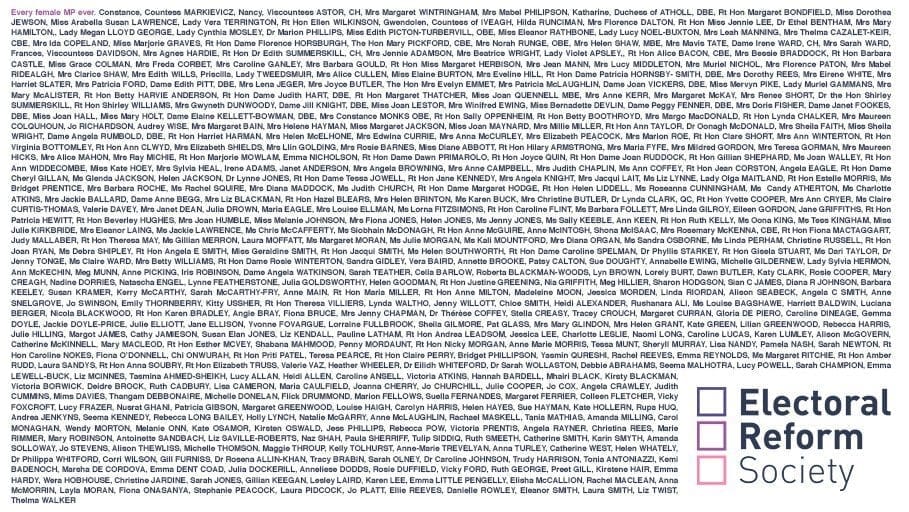 Image: The names of every female MP ever. 489 women have become MPs since 1918 (compared to the 442 male MPs in parliament right now).
Image: The names of every female MP ever. 489 women have become MPs since 1918 (compared to the 442 male MPs in parliament right now).
Civil society groups and campaigners have come together to demand the government takes action on women’s political representation this International Women’s Day.
The Centenary Action Group are calling on the government to implement the recommendations of the Women and Equalities Select Committee – which backed setting a target for 45 percent representation of women in Parliament and local government by 2030.
Other proposals included ‘robust procedures in place to prevent intimidation, bullying or sexual harassment’, a statutory minimum of female representation among party candidates, asking parties to publish candidate diversity data, and investment in training and development for women party members.
The report, published in December 2016, stated:
“We are concerned that Parliament is failing to be a world leader on women’s representation. The under-representation of women MPs does not only represent a serious democratic deficit; it also means that the UK is missing out on the benefits of having gender balance in its highest decision-making body.
“As the gatekeepers of political office, political parties are in a key position to improve the representation of women in the Commons.”
Yet the government’s response – nearly a full year later – rejected the calls of the report.
Their joint statement – backed by the Electoral Reform Society – is below:
The Suffragettes were force-fed, beaten and imprisoned for calling for the right to vote. 100 years on a global study of women MPs found that 82% experienced psychological violence.
Among them, 44% said they had received threats of death, rape, beatings or abduction during their parliamentary terms, including threats to kidnap or kill their children.
Given these shocking levels of violence and abuse on and off-line and the disproportionate targeting and impact on poor, black and minority ethnic women, it is no surprise that women’s political participation remains so low.
This IWD, our new campaigning coalition of 50+ organisations calls on the UK government to urgently remove the barriers to representation at home and abroad, starting with implementing in full the Women and Equalities Committee recommendations on women in the House of Commons – all of which have been previously dismissed.
Those that are currently most affected by violence, abuse and harassment need to be front and centre of efforts to address it.
Their voices must be raised and their stories heard. It is time for a new generation of women leaders.
Centenary Action Group
Signed:
Akeela Ahmed, Equalities Campaigner, Women’s March London
Frances Scott, Founder of 50:50 Parliament
Hannah Bond and Zarina Khan, Directors, Gender Action for Peace and Security
Harriet Harman MP, Mother of the House
Helen Pankhurst, Women’s Rights Activist and Great Granddaughter of Emmeline Pankhurst
Darren Hughes, CEO, Electoral Reform Society
Dr Mary-Ann Stephenson, Director, UK Women’s Budget Group
Dr Shola Mos-Shogbamimu, Lawyer and Women’s Rights Activist. Women in Leadership Publication
Dr Yvonne Thompson CBE, Entrepreneur & Business Leader
Faeeza Vaid, Executive Director, Muslim Women’s Network UK
Amelia Womack, Deputy Leader of the Green Party
Barbara Dixon, Programme Director, Soroptimist International Great Britain and Ireland
Baroness Anne Jenkin, Co-founder & Co-chair of Women2Win
Bee Rowlatt, Chair, Mary on the Green
Brita Fernandez Schmidt, Executive Director, Women for Women International UK
Catherine Mayer, Co-Founder, Women’s Equality Party
Helene Reardon Bond OBE, Women’s Rights Campaigner and former Head of Gender and Equality GEO
Jess Phillips MP, Chair of Women’s Parliamentary Labour Party
Jo Swinson MP, Deputy Leader and Spokesperson on Foreign and Commonwealth Affairs, Liberal Democrats
Julie Siddiqi, Co founder of Nisa-Nashim Jewish and Muslim Women’s Network
Kate Allen, CEO, Amnesty International UK
Katie Ghose, CEO, Women’s Aid
Kelley Temple, Advocacy Manager, Girlguiding
Laurie Lee, CEO CARE International UK
Lee Webster, Head of Policy and Comms, Womankind Worldwide
Lynne Stubbings, Chair, National Federation of Women’s Institutes
Mandy Sanghera, International Human Rights Activist
Natasha Walker, Founder and Director,Women for Refugee Women
Nimco Ali, Founder of Daughters of Eve
Professor Sarah Childs, University of London & author of The Good Parliament Guide
Sam Smethers, CEO Fawcett Society
Shaista Gohir OBE, Chair, Muslim Women’s Network UK
Shannon O’Connell, Westminster Foundation for Democracy
Vanessa Vallely, Founder and Director, WeAreTheCity